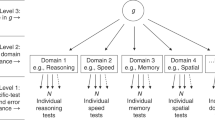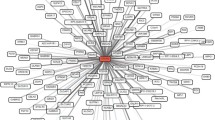Abstract
Active search for candidate genes whose polymorphisms are associated with human cognitive functions has been in progress in the past years. The study focused on the role that the insulin-like growth factor II (IGF2) gene may play in the variation of cognitive processes related to executive functions. The ApaI polymorphism of the IGF2 gene was tested for association with selective attention during visual search, working memory/mental control, and semantic verbal fluency in a group of 182 healthy individuals. The ApaI polymorphism was associated with the general cognitive index and selective attention measure. Carriers of genotype AA displayed higher values of the two parameters than carriers of genotype GG. It was assumed that the ApaI polymorphism of the IGF2 gene influences the human cognitive functions, acting possibly via modulation of the IGF-II level in the central nervous system.
Similar content being viewed by others
References
Deary, J., Spinath, F.M., and Bates, T.C., Genetics of Intelligence, Eur. J. Hum. Genet., 2006, vol. 14, pp. 690–700.
Sara, V.R. and Carlsson-Skwirut, C., Insulin-Like Growth Factors in the Central Nervous System, Growth Factors: From Genes to Clinical Application, Sara, V.R., et al., Eds., New York: Raven, 1990, pp. 179–191.
Kolychev, A.P., Insulin-Like Growth Factor II (IFR-2): The Place among Regulatory Peptides of the Insulin Superfamily, Zh. Evol. Biokhim. Fiziol., 2000, vol. 36, no. 2, pp. 69–82.
Ayer-Le Lievre, C., Stahlbom, P.-A., and Sara, V.R., Expression of IGF-I and -II mRNA in the Brain and Craniofacial Region of the Rat Fetus, Development, 1991, vol. 111, pp. 105–115.
Ohlsson, R., Holmgren, L., Glaser, A., et al., Insulin-Like Growth Factor 2 and Short-Range Stimulatory Loops in Control of Human Placental Growth, EMBO J., 1989, vol. 8, pp. 1993–1999.
Constancia, M., Hemberger, M., Hughes, J., et al., Placental-Specific IGF-II Is a Major Modulator of Placental and Fetal Growth, Nature, 2002, vol. 417, pp. 945–948.
Sibley, C.P., Coan, P.M., Ferguson-Smith, A.C., et al., Placental-Specific Insulin-Like Growth Factor 2 (IGF2) Regulates the Diffusional Exchange Characteristics of the Mouse Placenta, Proc. Natl. Acad. Sci. U.S.A., 2004, vol. 101, pp. 8204–8208.
Sussenbach, J.S., The Gene Structure of the Insulin-Like Growth Factor Family, Prog. Growth Factor Res., 1989, vol. 1, pp. 33–48.
Giannoukakis, N., Deal, C., Paquette, J., et al., Parental Genomic Imprinting of the Human IGF2 Gene, Nat. Genet., 1993, vol. 4, pp. 98–101.
Ekstrom, T.J., Cui, H., Li, X., and Ohlsson, R., Promoter-Specific IGF2 Imprinting Status and Its Plasticity during Human Liver Development, Development, 1995, vol. 121, pp. 309–316.
Wu, H.K., Squire, J.A., Song, Q., and Weksberg, R., Promoter-Dependent Tissue-Specific Expressive Nature of Imprinting Gene, Insulin-Like Growth Factor II, in Human Tissues, Biochem. Biophys. Res. Commun., 1997, vol. 233, pp. 221–226.
McKelvie, P.A., Rosen, K.M., Kinney, H.C., and Villa-Komaroff, L., Insulin-Like Growth Factor II Expression in the Developing Human Brain, J. Neuropathol. Exp. Neurol., 1992, vol. 51, pp. 464–471.
Ohlsson, R., Hedborg, F., Holmgren, L., et al., Overlapping Patterns of IGF2 and H19 Expression during Human Development: Biallelic IGF2 Expression Correlates with a Lack of H19 Expression, Development, 1994, vol. 120, pp. 361–368.
Pham, N.V., Nguyen, M.T., Hu, J.F., et al., Dissociation of IGF2 and H19 Imprinting in Human Brain, Brain Res., 1998, vol. 810, pp. 1–8.
Ulaner, G.A., Yang, Y., Hu, J.F., et al., CTCF Binding at the Insulin-Like Growth Factor-II (IGF2)/H19 Imprinting Control Region Is Insufficient to Regulate IGF2/H19 Expression in Human Tissues, Endocrinology, 2003, vol. 144, pp. 4420–4426.
Lauterio, T.J., Regulation and Physiological Function of Insulin-Like Growth Factors in the Central Nervous System, Molecular Biology and Physiology of Insulin and Insulin-like Growth Factors, Raizada, M.K. and LeRoith, D., Eds., New York: Plenum, 1991, pp. 419–430.
LeRoith, D., Werner, H., Faria, T.N., et al., Insulin-Like Growth Factor Receptors: Implications for Nervous System Function, Ann. N.Y. Acad. Sci., 1993, vol. 692, pp. 22–32.
O’Dell, S.D., Miller, G.J., Cooper, J.A., et al., Apal Polymorphism in Insulin-Like Growth Factor II (IGF2) Gene and Weight in Middle-Aged Males, Int. J. Obes. Relat. Metab. Disord., 1997, vol. 21, pp. 822–825.
Gaunt, T.R., Cooper, J.A., Miller, G.J., et al., Positive Associations between Single Nucleotide Polymorphisms in the IGF2 Gene Region and Body Mass Index in Adult Males, Hum. Mol. Genet., 2001, vol. 10, pp. 1491–1501.
Bachner-Melman, R., Zohar, A.H., Nemanov, L., et al., Association between the Insulin-Like Growth Factor 2 Gene (IGF2) and Scores on the Eating Attitudes Test in Nonclinical Subjects: A Family-Based Study, Am. J. Psychiatr., 2005, vol. 162, pp. 2256–2262.
Heude, B., Ong, K.K., Luben, R., et al., Study of Association between Common Variation in the Insulin-Like Growth Factor 2 Gene and Indices of Obesity and Body Size in Middle-Aged Men and Women, J. Clin. Endocrinol. Metab., 2007, vol. 92, pp. 2734–2738.
Gomes, M.V., Soares, M.R., Pasqualim-Neto, A., et al., Association between Birth Weight, Body Mass Index and IGF2/ApaI Polymorphism, Growth Horm. IGF Res., 2005, vol. 15, pp. 360–362.
Kaku, K., Osada, H., Seki, K., and Sekiya, S., Insulin-Like Growth Factor 2 (IGF2) and IGF2 Receptor Gene Variants Are Associated with Fetal Growth, Acta Paediatr., 2007, vol. 96, pp. 363–367.
Ford, R.M., Neulinger, K., O’Callaghan, M., et al., Executive Function in 7–9-Year-Old Children Born Extremely Preterm or with Extremely Low Birth Weight: Effects of Biomedical History, Age at Assessment, and Socioeconomic Status, Arch. Clin. Neuropsychol., 2011, vol. 26, pp. 632–644.
Olivieri, I., Bova, S.M., Urgesi, C., et al., Outcome of Extremely Low Birth Weight Infants: What’s New in the Third Millennium? Neuropsychological Profiles at Four Years, Early Hum. Dev., 2012, vol. 88, pp. 241–250.
Matte, T.D., Bresnahan, M., Begg, M.D., and Susser, E., Influence of Variation in Birth Weight within Normal Range and within Sibships on IQ at Age 7 Years: Cohort Study, EMB J., 2001, vol. 323, p. 310.
Yang, S., Tilling, K., Martin, R., et al., Pre-Natal and Post-Natal Growth Trajectories and Childhood Cognitive Ability and Mental Health, Int. J. Epidemiol., 2011, vol. 40, pp. 1215–1226.
Alvarez, J.A. and Emory, E., Executive Function and the Frontal Lobes: A Meta-Analytic Review, Neuropsychol. Rev., 2006, vol. 16, pp. 17–42.
Alfimova, M.V. and Golimbet, V.E., Otsenka kognitivnykh funktsii v praktike mediko-geneticheskogo konsul’tirovaniya pri shizofrenii. Metodicheskie rekomendatsii (Assessment of Cognitive Functions in the Practice of Medical and Genetic Consulting in Case of Schizophrenia), Moscow: Nauch. tsentr prof. zdorov., Ross. akad. med. nauk, 2011.
Hsieh, Y.-Y., Chang, C.-C., Tsai, F.-J., et al., Insulin-Like Growth Factor II Gene Apa I Polymorphism Is not Associated with Endometriosis Susceptibility, Genet. Mol. Biol., 2004, vol. 27, pp. 165–166.
Bai, B., Li, W., Yao, Y., et al., The Correlation of Serum Levels of Insulin-Like Growth Factors and Intrauterine Growth: Report of a Study in Rats, Hua Xi Yi Ke Da Xue Xue Bao, 2000, vol. 31, pp. 356–357.
Coan, P.M., Fowden, A.L., Constancia, M., et al., Disproportional Effects of IGF2 Knockout on Placental Morphology and Diffusional Exchange Characteristics in the Mouse, J. Physiol., 2008, vol. 586, pp. 5023–5032.
Cheng, B. and Mattson, M.P., IGF-I and IGF-II Protect Cultured Hippocampal and Septal Neurons against Calcium-Mediated Hypoglycemic Damage, J. Neurosci., 1992, vol. 12, pp. 1558–1566.
Cherrier, M.M., Plymate, S., Mohan, S., et al., Relationship between Testosterone Supplementation and Insulin-Like Growth Factor-I Levels and Cognition in Healthy Older Men, Psychoneuroendocrinology, 2004, vol. 29, pp. 65–82.
Agis-Balboa, R.C., Arcos-Diaz, D., Wittnam, J., et al., A Hippocampal Insulin-Growth Factor 2 Pathway Regulates the Extinction of Fear Memories, EMBO J., 2011, vol. 30, pp. 4071–4083.
Chen, D.Y., Stern, S.A., Garcia-Osta, A., et al., A Critical Role for IGF-II in Memory Consolidation and Enhancement, Nature, 2011, vol. 469, no. 7331, pp. 491–497.
Dikkes, P., Jaffe, D.B., Guo, W.H., et al., IGF2 Knockout Mice Are Resistant to Kainic Acid-Induced Seizures and Neurodegeneration, Brain Res., 2007, vol. 1175, pp. 85–95.
Sutherland, G., Mellick, G., Newman, J., et al., Haplotype Analysis of the IGF2-INS-TH Gene Cluster in Parkinson’s Disease, Am. J. Med. Genet., Part B, 2008, vol. 147B, pp. 495–499.
Vafiadis, P., Bennett, S.T., Todd, J.A., et al., Divergence between Genetic Determinants of IGF2 Transcription Levels in Leukocytes and of IDDM2-Encoded Susceptibility to Type 1 Diabetes, J. Clin. Endocrinol. Metab., 1998, vol. 83, pp. 2933–2939.
Chorney, M.J., Chorney, K., Seese, N., et al., A Quantitative Trait Locus Associated with Cognitive Ability in Children, Psychol. Sci., 1998, vol. 9, pp. 159–166.
Brown, J., Jones, E.Y., and Forbes, B.E., Keeping IGF-II under Control: Lessons from the IGF-II-IGF2R Crystal Structure, Trends Biochem. Sci., 2009, vol. 34, pp. 612–619.
Author information
Authors and Affiliations
Corresponding author
Additional information
Original Russian Text © M.V. Alfimova, T.V. Lezheiko, I.K. Gritsenko, V.E. Golimbet, 2012, published in Genetika, 2012, Vol. 48, No. 8, pp. 993–998.
Rights and permissions
About this article
Cite this article
Alfimova, M.V., Lezheiko, T.V., Gritsenko, I.K. et al. Association of the insulin-like growth factor II (IGF2) gene with human cognitive functions. Russ J Genet 48, 846–850 (2012). https://doi.org/10.1134/S1022795412080029
Received:
Published:
Issue Date:
DOI: https://doi.org/10.1134/S1022795412080029




